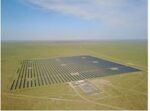Mega solar power plant in Quang Ngai Province, Vietnam
Large 49 MW-dc output enough to power 38,762 households(1) Completed Solar Power Plant TOKYO: Sharp Energy Solutions Corporation (SESJ)(2) announces the completion of a mega solar power plant in Quang Ngai Province, Vietnam. The project was a collaboration with multiple partners, including Sermsang Power Corporation (SSP)(3) of Thailand, and SSP affiliate Truong Than Quang Ngai Power and High Technology Joint Stock Company(4). Operations at the new mega plant will start in early June. The new plant has an output of approximately 49 MW-dc, with annual power generation capacity estimated at 73,143 MWh/year. This is equivalent to the amount consumed in a year by 38,762 average Vietnamese households. Sharp has so far constructed three solar power plants in Vietnam, for a combined capacity of approximately 146 MW-dc. This new plant will raise the total capacity to approximately 195 MW-dc. The Vietnamese government has formulated a plan(5) to raise solar power generation capacity in the country to 12,000 MW by the year 2030. Sharp remains committed to spreading renewable energy in Vietnam. (1) Calculated at 1,887 kWh per household. (2) SESJ is a subsidiary of Sharp Corporation, specializing in energy solutions such as the sales of PV systems and the installation of electrical equipment. (3) SSP’s main business is constructing solar power plants in ASEAN countries. (4) This company will be in charge of operating the new plant. (5) Source: the Vietnamese government?s 7th Power Development Plan (PDP7).










